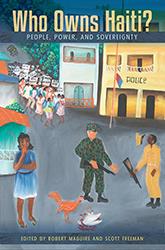Challenging the common view that Latin America has lagged behind Europe and North America in the global history of science, this volume reveals that the region has long been a center for scientific innovation and imagination. It highlights the important relationship between science, politics, and culture in Latin American history.
Browse by Subject: Other
Please note that while you may order forthcoming books at any time, they will not be available for shipment until shortly before publication date
This volume provides a hemispheric view of the practice of digital humanities in the Spanish- and Portuguese-speaking Americas. These essays examine how participation and research in new media have helped configure new identities and collectivities in the region.
The Insubordination of Photography is the first book to analyze how various collectives, organizations, and independent media used photography to expose and protest the crimes of Chilean dictator Augusto Pinochet’s regime. Featuring never-before-seen photos and other archival material, this book reflects on the integral role of images in public memory and issues of reparation and justice.
This collection of essays offers a comprehensive overview of colonial legacies of racial and social inequality in Latin America and the Caribbean. Rich in theoretical framework and close textual analysis, these essays offer new paradigms and approaches to both reading and resolving the opposing forces of race, class, and the power of states.
After the end of the Mexican Revolution in 1917, post-revolutionary leaders hoped to assimilate the country’s racially diverse population into one official mixed-race identity—the mestizo. This book shows that as part of this vision, the Mexican government believed it could modernize “primitive” indigenous peoples through technology in the form of education, modern medicine, industrial agriculture, and factory work. David Dalton takes a close look at how authors, artists, and thinkers—some state-funded, some independent—engaged with official views of Mexican racial identity from the 1920s to the 1970s.
Much has been made of the dramatic rise of Protestantism in Latin America. Many view this as a sign that Catholicism’s primacy in the region is at last beginning to wane. Overlooked by journalists and scholars has been the parallel growth of Charismatic, or Pentecostal, Catholicism in the region. Edward Cleary offers the first comprehensive treatment of this movement, revealing its importance to the Catholic Church as well as the people of Latin America.
Telling Migrant Stories explores how contemporary documentary film gives voice to Latin American immigrants whose stories would not otherwise be heard.
Who Owns Haiti? explores the role of international actors in the country's sovereign affairs while highlighting the ways in which Haitians continually enact their own independence on economic, political, and cultural levels.
Sinan Koont has spent the last several years researching urban agriculture in Cuba, including field work at many sustainable farms on the island. He tells the story of why and how Cuba was able to turn to urban food production on a large scale with minimal use of chemicals, petroleum, and machinery, and of the successes it achieved--along with the continuing difficulties it still faces in reducing its need for food imports.
Nineteenth-century Spanish American writers reimagined gender roles, modernization, and national identity during Spanish America’s uneven transition toward modernity. This ambitious volume surveys an expansive and diverse range of countries across the nineteenth-century Spanish-colonized Americas, showing how both men and women used the discourses of modernity to envision the place of women at all levels of social and even political life in the modern, utopian nation.











